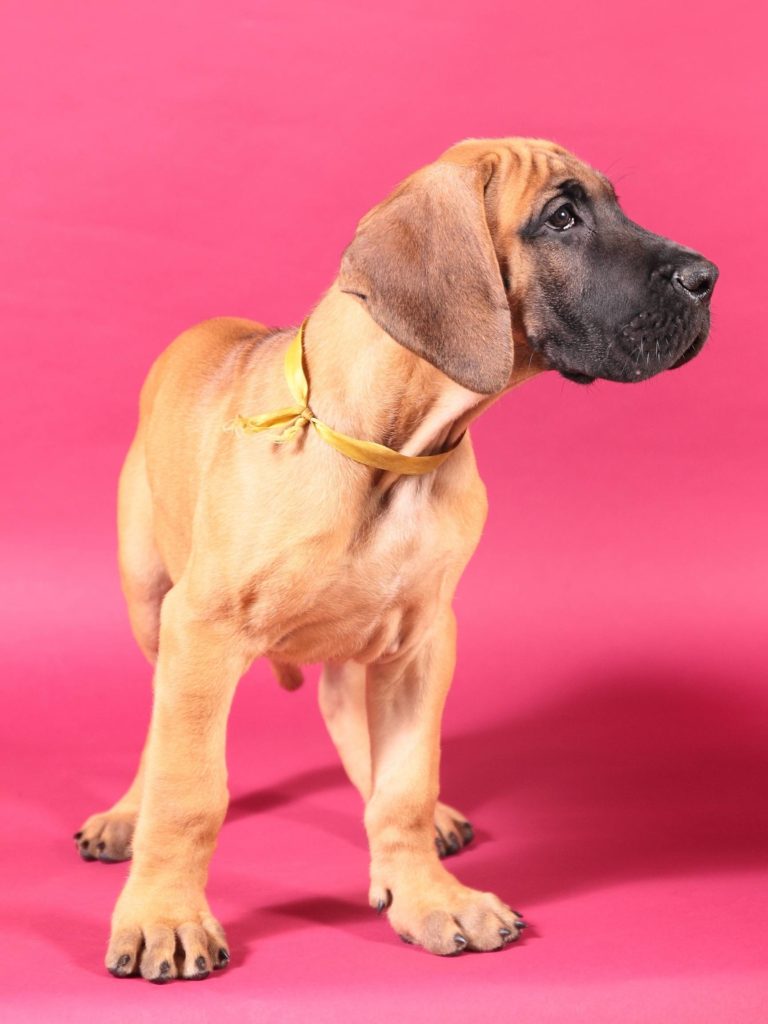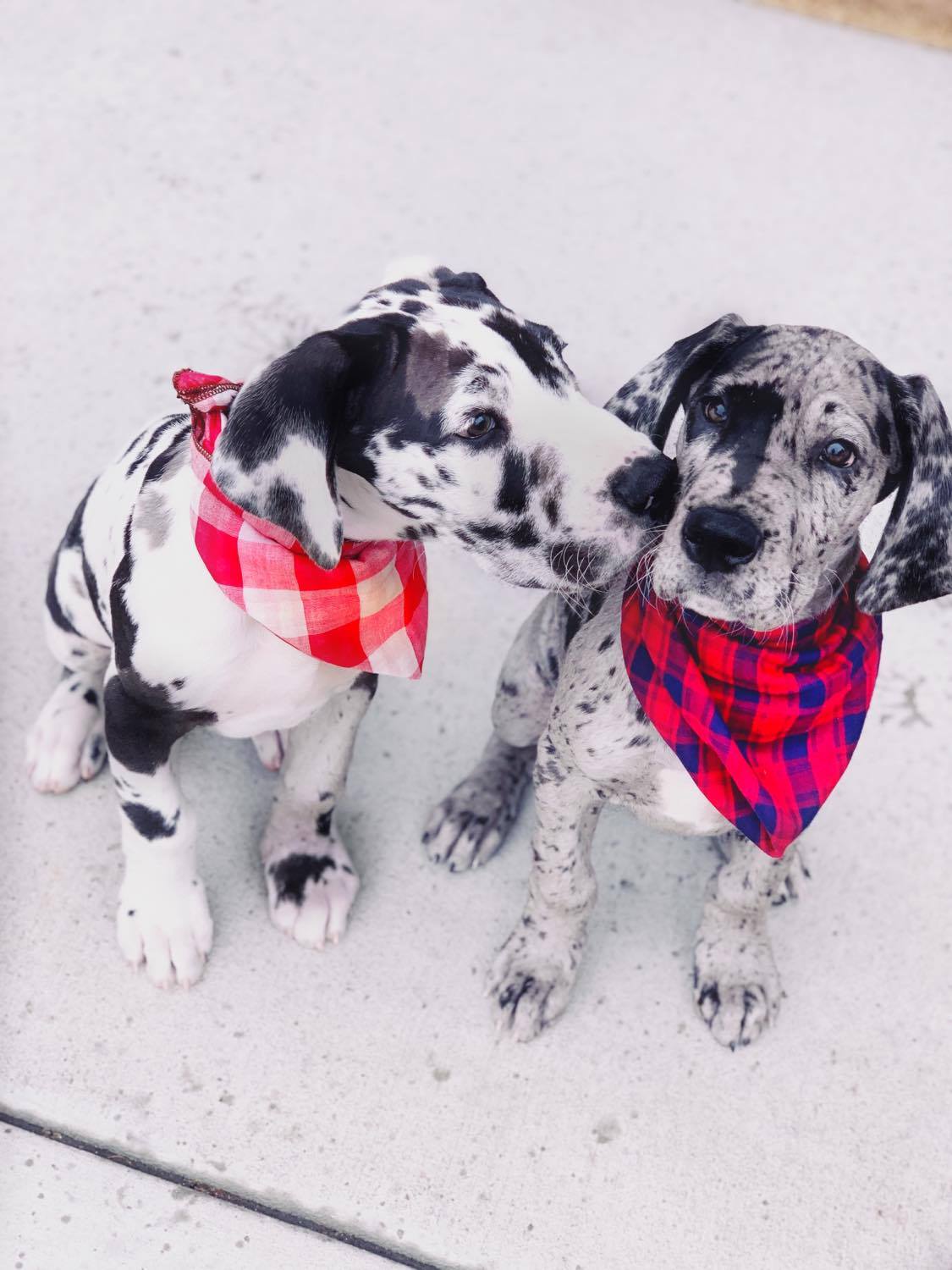If you recently got a Great Dane puppy, you may be wondering if your puppy is growing well and the right size!
We’ve recently seen many people with extremely small 8 and 9 week old Great Dane puppies asking this question, and it turns out that one of three things is happening:
a. Their puppy was sent home very young (an extremely unethical breeding practice, especially if the breeder is lying about age). A 6 week old Great Dane is too young to leave the litter.
b. The puppy is either poorly bred (bad genetics) or mixed somewhere in the line, and the breeder lied about it.
c. The puppy has parasites, a congenital disorder (such as megaesophagus) or is failing to thrive in some way.
In some cases, puppies are just small and that is ok too! Female great dane puppies are often smaller than males as well.
Read on for more information about whether or not your Great Dane puppy is too small or just right.
HEALTHY DANE PUPPIES
A healthy 8 week old Great Dane puppy that was thoughtfully bred, well socialized & properly cared for while still with the breeder will:
- Have huge feet and ideally, tight knuckles
- Have ‘heft’ and be weighty to pick up (plenty of ‘substance’ and ‘bone’), won’t feel scrawny
- Be curious, not timid or fearful
- Have trimmed nails
- Have bright, neat clean eyes and large clean ears
- Weigh between 15-30lbs
If you are concerned, chat with your veterinarian! They can easily tell you if your Great Dane puppy is healthy and growing on track.
You can also reference our Great Dane Growth Chart HERE.
Chances are, your Great Dane puppy is perfect! Each dog is different. Even from the same litter, sizes can vary, especially when comparing males to females or looking at a known runt that is still trying to catch up.
RED FLAGS
Here are the red flags that your puppy is actually behind, underage or struggling to thrive:
- The puppy isn’t gaining quickly and may appear scrawny and weak: see a veterinarian.
- The puppy has a large, round distended tummy: parasites and worms may be a problem.
- The puppy has sores and infections; chat with your veterinarian. You may also need to report the breeder to animal control.
- The puppy lacks energy while awake.
- The puppy has low muscle tone, flat feet, weak pasterns, weak hips and a weak core.
- The puppy is vomiting, shaking, and/or has diarrhea (see a veterinarian immediately).
- The puppy is extremely fearful and timid.
.A puppy that is under 15 lbs may just be a small puppy, especially if it came from a particularly large litter. If your puppy is otherwise thriving, don’t stress! He or she will likely catch up.
Some small puppies are not actually full Great Dane; study the pedigree and ask questions. Look at the parents and compare them to the written standard for Great Danes. Unethical breeding practices are resulting in a lot of ‘papered’ Great Danes that don’t really look like Great Danes. If this has happened to you, it’s ok! You have a wonderful family pet and that is what matters.
There is never a reason to sell a puppy prior to 8 weeks of age. If your puppy is small and immature, chat with your breeder! This practice is highly unethical and some breeders may even lie about age to get the puppies out of the house.
PROPER GROWTH
Do not overfeed or supplement your puppy to make it grow faster.
With Great Danes, slow growth is key.
Over-nutrition and fatty foods can cause pancreatitis or increase the risk that the puppy develops hip dysplasia and other bone and growth disorders such as knuckling, HOD and Panosteitis.
Bigger is not better! Forcing growth on a Great Dane and promoting overweight and oversized structure is painful, unhealthy and unfair.
If your Great Dane puppy is actually struggling to thrive, see a veterinarian with Giant Breed experience.
No matter what, love the dog in front of you!
It is OK to have a smaller Great Dane! Your dog does not have to be larger than life to still be a very large, wonderful dog.
If you are concerned about the health of your Great Dane puppy, chat with your veterinarian!
The information contained in this post is for informational purposes only. We do our best to present the most up-to-date research, however it is up to the reader to make decisions regarding the health and well-being of their dog. We make no claims here to prevent or treat bloat or any other condition related to Great Danes. Find a veterinarian with GIANT breed experience, and chat with them.
Some of the products we list on our website contain affiliate links. If you choose to make a purchase, we may receive a small commission for referring you. We only recommend products that we truly believe in. This commission does not affect the price of the product and is used to fund our content and expenses related to operating this website. We are powered by YOU!








